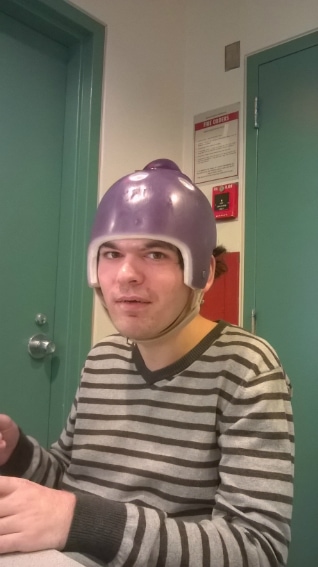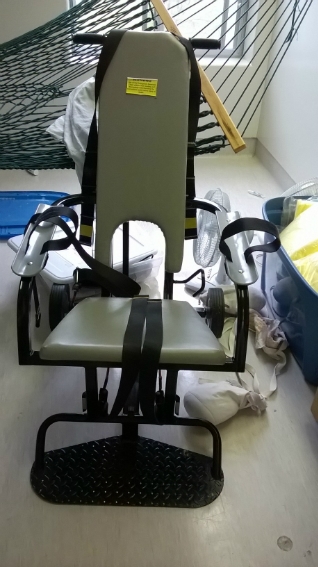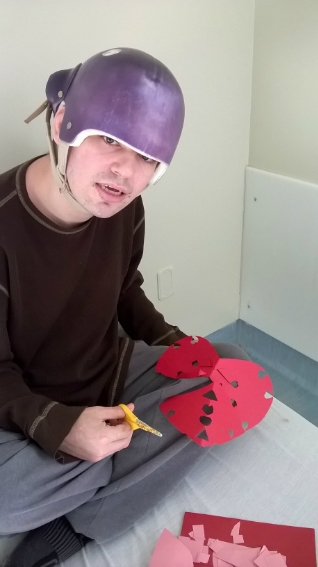KJIPUKTUK (Halifax) – Tracey Meisner, the mother of a 31-year old man who spent 12 years at Emerald Hall, a locked down unit at the Nova Scotia Hospital in Dartmouth, will continue to fight for her son’s quality of life, because that’s what mothers do.
“Persistence pays off is is what I keep telling myself. The only way to get change is to not give up, even when I feel like it. I love him and I want a better life for him,” she says.

Matthew lives with autism and severe mood disorders that make his behaviour unpredictable and at times aggressive. The aggression often turns inward, as he tends to self-harm.
Meisner believes that to be his best Matthew needs a different environment than Emerald Hall.
But more than that, she wants to know that Matthew is safe, and a string of abusive events by staff, either proven or as yet alleged, have not offered her the peace of mind she craves.
“I wonder if this shit is retarded”
The most recent allegations that Matthew had been abused surfaced in October. In an effort to subdue him, staff placed a pillowcase over his head. Staff also constrained him in a so-called time out chair for almost two hours, an hour longer than policies allow.
Two witnesses reported that the person implicated referred to Matthew as “that little fucker” and said “I wonder if this shit is retarded” within Matthew’s hearing distance.
Meisner has felt ignored by management and staff ever since Matthew arrived at Emerald Hall twelve years ago. “I have been as marginalized as Matthew has been,” says Meisner. “It’s a horrible feeling, but you call them on it.”
Earlier complaint investigated for nine months and counting
As an example, Meisner talks about how police are looking into the most recent incident only because she insisted.

“When I was first informed about this complaint I said did you call the police and `the manager said well, we reported it to the protection for persons in care act, (triggering a government investigation). It was three times I asked about contacting the police, and then they told me to do it myself.” So she did.
An earlier complaint filed by Meisner has been under investigation for nine months now. That complaint deals with Matthew spending most of his days locked up in his room.
“Matthew looked very unwell, and he looked like he was losing weight,” says Meisner. “We asked about camera footage, and they were very evasive, and when we insisted they told us that footage is not available anymore, so it really felt as if we were getting the run around.”
Nine months is a long time for an investigation. But it might never have reached the that stage if it hadn’t been for Meisner’s refusal to give up.
“When I made that complaint, initially it did not go past the inquiry stage, which consisted of a phone call between the investigation officer and the unit manager. I asked, you just telephoned that person and she answered your questions, that was it? I got kind of mad about that,” says Meisner.
Meisner found a policy that essentially said that if there had been a prior complaint, new complaints must go directly to the investigation phase.
“So I called them and brought that to their attention, and then they called me back and said, yes, we’re going to investigate,” says Meisner.
There is little the Nova Scotia Health Authority (NSHA) can say about Matthew’s case specifically, wrote Kristen Lipscombe, spokesperson for the NSHA, in response to our earlier story in October.
“Nova Scotia Health Authority takes the privacy and confidentiality of our patients very seriously, and has an obligation to protect their personal information under provincial legislation. We cannot answer questions or release details on specific cases,” Lipscombe wrote.
I am made to feel like I am a troublemaker
“I am made to feel like I am a troublemaker, somebody who doesn’t accept her son’s situation,” says Meisner. “They’re just thinking she will get tired, and she will eventually stop.”

But Meisner is a troublemaker who frequently has been proven correct in her allegations.
Two earlier suspicions that her son was being abused by Emerald Hall staff were found to be justified, Meisner says.
Shortly after Matthews’s arrival at Emerald Hall it was discovered that he had been hit by front line staff while being held.
If it wasn’t for two courageous new workers reporting the physical abuse by their colleagues nobody would have known. The case went to court and two workers lost their jobs.
There was also an instance in 2014 when a front line worker was found to have used excessive force. That worker, although no longer in charge of Matthew, still works at Emerald Hall.
They always want a telephone call
Over the years Meisner has learned how to navigate bureaucracies. For instance, she always documents her interactions and makes sure they’re on record.
“When I email, I always include others up the chain of command, and I tell you, they don’t like it. It was remarked to me that there was no need to include head office. They always want a telephone call. I said, I don’t do phone calls,” says Meisner.
Meisner is also fearless when it comes to defending her son.
“Not that long ago Matthew and I had lunch together, and he wanted to go upstairs to the canteen, he loves it when he can go make his own purchases, his treats and stuff. The staff said, no, he is not allowed to go there, doctor’s orders,” Meisner tells the Nova Scotia Advocate.
“I said, well, I am going against doctor’s orders. People were all buzzing around, they were going to the manager. I just took Matt upstairs, and he was so happy. I took him upstairs, and nobody died.”
How many Matthews are out there?
Articulate and fearless is a rare combination. Throw in stubbornness, and not many parents will match Meisner in the qualities that allow her to stand up for her son.
But you have to wonder how many Matthews are out there who aren’t so lucky as to have a loved one such as Meisner advocate for them.
76 incidents of abuse were found to have occurred at institutions for people with developmental disabilities province-wide between 2012 and 2015, according to a government response to a Freedom of Information request I submitted on behalf of the Halifax Media Co-op.
Those numbers do not include the Nova Scotia Hospital.
Staff were perpetrators of the abuse in 32 cases. The remainder involved abuse between residents.
That’s a lot of abuse, considering we are dealing with a relatively small population of 2,340 persons. When you do the math it suggests that one in twenty residents of larger facilities fell victim to abuse in the three year period.
You wonder how many of such incidents remain unreported, given that residents are vulnerable and sometimes lack basic communication skills.
One thing that helped Meisner is the support of Brenda Hardiman, and the Advocating Parents of Nova Scotia (APNS) organization she chairs, Meisner says. Hardiman fought her own battles to move her daughter out of an institution, and has been supporting many other parents in similar situations ever since.
“Having Brenda and APNS made a huge difference. They’re there to help, and they will help. There’s strength in numbers,” says Meisner.
If you can, please support the Nova Scotia Advocate so that it can continue to cover issues such as poverty, racism, exclusion, workers’ rights and the environment in Nova Scotia.




So, exactly how did Matthew end up institutionalized?
Why did mom give him up to an institution?
Was behavioural intervention used before the decision to institutionalize Matthew was finalized?
Sounds a bit like blaming the victim. There are lots of reasons why adults end up in institutions. We have a lack of resources in NS, and when an institution that is staffed 24/7 with a variety of professionals can’t provide appropriate care, how would you expect one person to do it? This mother obviously loves her son and wants what is best for him.
The NSHA staff can’t make comment because of confidentiality so this is all really one sided, but I can imagine there’s more to this story than what is described on here. This patient population can be extremely aggressive so I imagine there’s good reason he can’t be taken off the unit. Doesn’t excuse the allegations of abuse but I would think there’s more to it than that.
I live in Ontario where institutions such as this are now closed, mostly because of stories like this and much worse. Class action law suits and monetary settlements have be made as well as apologies from the government for the atrocities that happened in these places. We now have a whole new problem, that is, finding adequate housing for those with developmental disabilities, Yes, they often live in their family home as children and well into adulthood, but what happens then? There are only so many spaces available through Community Living and other similar organizations. Caring parents get to a point in life that they are not able to care for their adult children any longer and there are very few alternatives. There is a grassroots movement in my community where parents have joined together and are looking at solutions that are out of the box so their children will continue to live in caring, nurturing and respectful environments. My heart aches for this mother. Keep on fighting.
You are not alone.
The same situation exists in Ontario.
A bias and prejudice education and social system not at all structured on human developmental best practices continues the life long hardships of adults (children and youth) with developmental delays. Of course those systems are designed and continued by people who are ignorant and not highly compassionate.
Parents like Meisner are needed to advocate for their children. It ensures that the system is questioned when it should be – keeping it safe for what can be a vulnerable population. Bless her for her efforts!